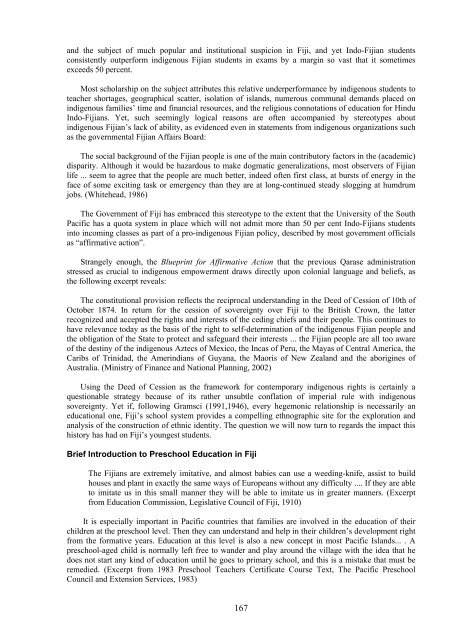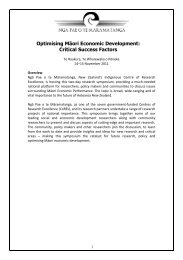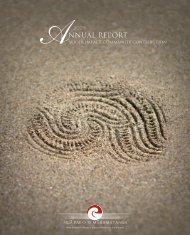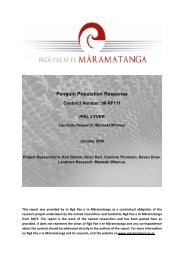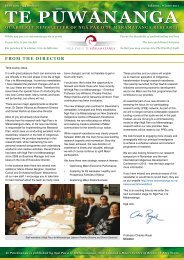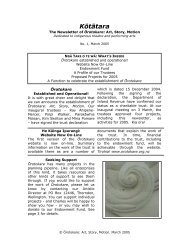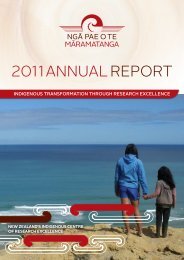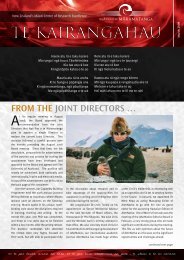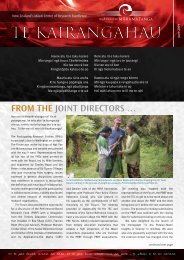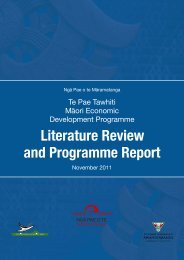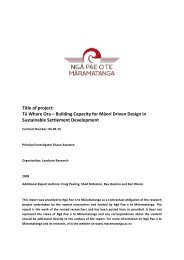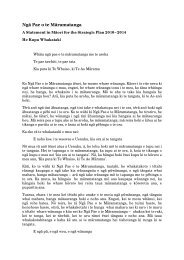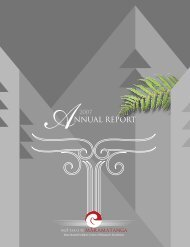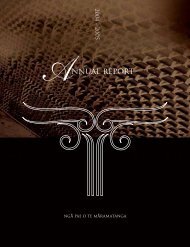traditional knowledge conference 2008 te tatau pounamu
traditional knowledge conference 2008 te tatau pounamu
traditional knowledge conference 2008 te tatau pounamu
You also want an ePaper? Increase the reach of your titles
YUMPU automatically turns print PDFs into web optimized ePapers that Google loves.
and the subject of much popular and institutional suspicion in Fiji, and yet Indo-Fijian studentsconsis<strong>te</strong>ntly outperform indigenous Fijian students in exams by a margin so vast that it sometimesexceeds 50 percent.Most scholarship on the subject attribu<strong>te</strong>s this relative underperformance by indigenous students to<strong>te</strong>acher shortages, geographical scat<strong>te</strong>r, isolation of islands, numerous communal demands placed onindigenous families’ time and financial resources, and the religious connotations of education for HinduIndo-Fijians. Yet, such seemingly logical reasons are of<strong>te</strong>n accompanied by s<strong>te</strong>reotypes aboutindigenous Fijian’s lack of ability, as evidenced even in sta<strong>te</strong>ments from indigenous organizations suchas the governmental Fijian Affairs Board:The social background of the Fijian people is one of the main contributory factors in the (academic)disparity. Although it would be hazardous to make dogmatic generalizations, most observers of Fijianlife ... seem to agree that the people are much bet<strong>te</strong>r, indeed of<strong>te</strong>n first class, at bursts of energy in theface of some exciting task or emergency than they are at long-continued s<strong>te</strong>ady slogging at humdrumjobs. (Whi<strong>te</strong>head, 1986)The Government of Fiji has embraced this s<strong>te</strong>reotype to the ex<strong>te</strong>nt that the University of the SouthPacific has a quota sys<strong>te</strong>m in place which will not admit more than 50 per cent Indo-Fijians studentsinto incoming classes as part of a pro-indigenous Fijian policy, described by most government officialsas “affirmative action”.Strangely enough, the Blueprint for Affirmative Action that the previous Qarase administrationstressed as crucial to indigenous empowerment draws directly upon colonial language and beliefs, asthe following excerpt reveals:The constitutional provision reflects the reciprocal understanding in the Deed of Cession of 10th ofOctober 1874. In return for the cession of sovereignty over Fiji to the British Crown, the lat<strong>te</strong>rrecognized and accep<strong>te</strong>d the rights and in<strong>te</strong>rests of the ceding chiefs and their people. This continues tohave relevance today as the basis of the right to self-de<strong>te</strong>rmination of the indigenous Fijian people andthe obligation of the Sta<strong>te</strong> to pro<strong>te</strong>ct and safeguard their in<strong>te</strong>rests ... the Fijian people are all too awareof the destiny of the indigenous Az<strong>te</strong>cs of Mexico, the Incas of Peru, the Mayas of Central America, theCaribs of Trinidad, the Amerindians of Guyana, the Maoris of New Zealand and the aborigines ofAustralia. (Ministry of Finance and National Planning, 2002)Using the Deed of Cession as the framework for con<strong>te</strong>mporary indigenous rights is certainly aquestionable stra<strong>te</strong>gy because of its rather unsubtle conflation of imperial rule with indigenoussovereignty. Yet if, following Gramsci (1991,1946), every hegemonic relationship is necessarily aneducational one, Fiji’s school sys<strong>te</strong>m provides a compelling ethnographic si<strong>te</strong> for the exploration andanalysis of the construction of ethnic identity. The question we will now turn to regards the impact thishistory has had on Fiji’s youngest students.Brief Introduction to Preschool Education in FijiThe Fijians are extremely imitative, and almost babies can use a weeding-knife, assist to buildhouses and plant in exactly the same ways of Europeans without any difficulty .... If they are ableto imita<strong>te</strong> us in this small manner they will be able to imita<strong>te</strong> us in grea<strong>te</strong>r manners. (Excerptfrom Education Commission, Legislative Council of Fiji, 1910)It is especially important in Pacific countries that families are involved in the education of theirchildren at the preschool level. Then they can understand and help in their children’s development rightfrom the formative years. Education at this level is also a new concept in most Pacific Islands... . Apreschool-aged child is normally left free to wander and play around the village with the idea that hedoes not start any kind of education until he goes to primary school, and this is a mistake that must beremedied. (Excerpt from 1983 Preschool Teachers Certifica<strong>te</strong> Course Text, The Pacific PreschoolCouncil and Ex<strong>te</strong>nsion Services, 1983)167


